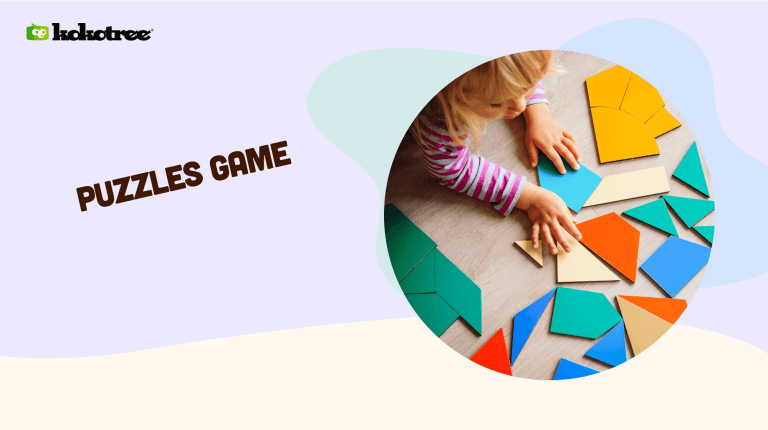

Let’s talk about the vibrant world of puzzles, a game that has maintained its charm among children through the years.
Puzzles are the perfect blend of fun and education, fostering many skills ranging from motor coordination to cognitive abilities.
Specifically, more advanced puzzle variants designed for slightly older preschoolers are an excellent tool to engage and develop their budding problem-solving skills.
A puzzle is an entertaining game that challenges a child’s problem-solving skills. It typically involves assembling numerous interlocking pieces to form a complete picture or object. They come in numerous forms, appropriate for different age groups, with more complicated versions designed particularly for older preschoolers. Puzzles are popular among preschool games due to their cognitive, motor, and emotional benefits.
For ages 2-6. They watch and play for 20 minutes. You get a break.
⭐ 5,000+ parents get daily breaks with Kokotree.
Try it Free →Works in 30 seconds • No credit card • Cancel anytime
To embark on an adventure with puzzles, you will need:
The main aim of playing puzzles is to assemble all the disconnected pieces into a complete picture or object. But beyond this, the objective expands to improving a child’s cognitive abilities, enhancing motor skills, developing patience, and nurturing problem-solving skills.
For ages 2-6. They watch and play for 20 minutes. You get a break.
⭐ 5,000+ parents get daily breaks with Kokotree.
Try it Free →Works in 30 seconds • No credit card • Cancel anytime
Follow these steps to engage in the delightful activity of puzzles:
Puzzles substantially boost several areas of development:
To amplify the joy of puzzles and its educational value, consider these variations:
Optimize the puzzle experience with these tips:
Here, we address some frequent queries:
Suitable ages for puzzles vary based on complexity. Simple puzzles can be introduced as early as 12 months, while more intricate puzzles are appropriate for older children and adults.
For toddlers, puzzles should be relatively simple with large, easy-to-handle pieces. Images should be clear and recognizable. Typically, puzzles with 3-10 pieces are a good starting point.
Yes, puzzles can aid in a child’s academic performance. They promote cognitive skills, problem-solving abilities, and enhance memory and spatial reasoning, which can benefit academic settings.
Children can play with puzzles as often as they enjoy them. Incorporating puzzle time into regular play is a great idea, as it can be entertaining and educational.
If a child consistently struggles, shows signs of frustration, or loses interest quickly, the puzzle might be too challenging. Ensuring the puzzle aligns with their developmental stage and abilities is essential.
Ensure the puzzles are age-appropriate as smaller pieces could pose a choking hazard for younger kids. Also, avoid puzzles with sharp edges that could harm your child.
Puzzles, undeniably a king among games for kids, offer an unmatched combination of fun and learning. Not only are they an interactive way of keeping children absorbed, but they also foster advanced problem-solving skills in preschoolers. With their wide range of benefits, puzzles are a go-to choice among toddler games. Engage your little ones in this magical, educational journey without delay!



